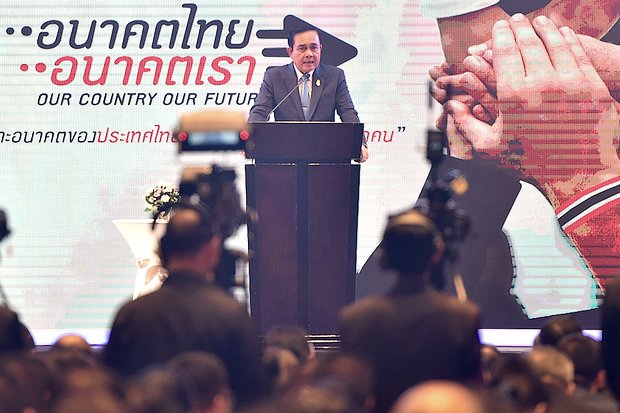
Prime Minister Prayut Chan-o-cha has leapt to the defence of the government's 20-year national strategy, saying he would not let any politicians scrap the plan that is designed to direct the country's long-term development over the next two decades.
Gen Prayut made the remark Thursday at a forum entitled "National Strategy, Thailand's Future, Our Future" organised by the National Economic and Social Development Board (NESDB).
The Prime Minister delivered the 90-minute keynote speech. (Note: Thai-language video)
Gen Prayut said several political parties are now threatening to derail the national strategy by saying they would scrap it if they are elected after the poll early next year.
"Several parties said if or when they become the government, they would scrap the national strategy. They will bring the country to its knees," Gen Prayut told the forum.
"Will the people accept this? That's impossible. This is your avenue, your path you have to pursue if you want progress," he said. By following the strategy, "future governments will not stray off course", he added.
The prime minister insisted the national strategy was designed for the benefit of national security and economic prosperity.
This is part of the National Strategy Act that was passed by the National Legislative Assembly (NLA) on June 22 last year. It took effect this Aug 1.
The 29-section law stipulated that a national strategy commission be set up and chaired by the prime minister.
The commission has drawn up a national strategy that it has been proposed and approved by the cabinet.
It can also give opinions to parliament, the cabinet or state agencies on issues involving the implementation of the national strategy; and supervise national reform to ensure its compliance with the national strategy.
The commission has also set up drafting committees in different fields.
The strategy covers: enhancing national security; strengthening national competitiveness; developing and empowering human capital; broadening opportunities to improve social equality; rebalancing and adjusting state administration; and creating economic growth in an environmentally friendly way.
The military regime hopes the 20-year national strategy will help Thailand have a continuous set of goals to achieve in an uninterrupted fashion.
The strategy makes it legally binding for future governments to fine-tune developmental policies, and ensure their budgets are aligned with it.
But critics have warned the national development plan over the next 20 years will act as a straitjacket for future governments, crippling their ability to make decisions to respond and adapt to changing circumstances.
They also said it was unfair that the coup-installed government is making plans to force the hands of future elected governments for the next 20 years.
Policies to be declared in parliament by new governments will need to toe the line set by the national strategy.
These include national economic and social development plans, as well as other plans on national security and education, budget allocation and the rules governing the practices of all ministries.
However, Deputy Prime Minister Wissanu Krea-ngam said earlier the national strategy law stipulates that it can be reviewed and adjusted every five years to respond to changing circumstances.
Commenting on the prime minister's remarks, Pheu Thai acting deputy secretary-general Chavalit Wichayasut said political parties must pay heed to the voice of the people.
After the election, any parties that form a government must keep their election promises, he added.
He insisted that if Pheu Thai were to win the election, which has tentatively been scheduled for late February, but disagree with the strategy, it would have to change it.
"We'll have to consider how best to deal with the problems facing us because the world is changing constantly," he said.
Noppadon Pattama, another Pheu Thai key figure, said the public does not have any say in the formulation of the national strategy because it has not been created during an elected government.
He said that it was wrong for the strategy to set out stringent legal measures to punish future governments if they fail to abide by it.
Mr Noppadon said that checks-and-balance mechanisms such as censure debates are the normal mechanisms to scrutinise political-office holders, so using legal action to force the hands of future governments was unwarranted.
Paradorn Prissananantakul, a key figure in the Chartthaipattana Party, said the 20-year strategy was drawn up by a small group and it would not respond to the need to boost the country's competitiveness.
